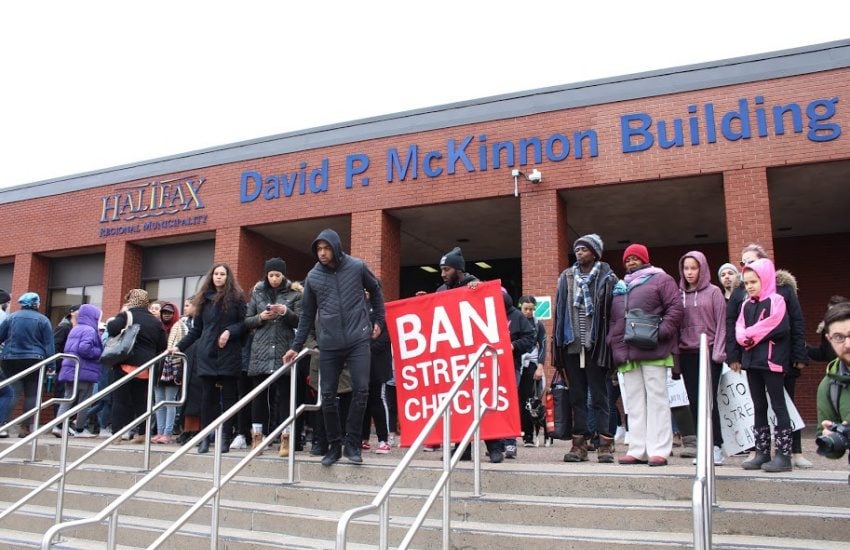
KJIPUKTUK (Halifax) – After street checks were determined to be illegal in October 2019, Mark Furey, the Justice minister at the time, put a stop to the practice.
Case closed, you might think. Time to move on.
Unfortunately no, says Vanessa Fells, Director of Operations with the African Nova Scotian Decade for People of African Descent Coalition (ANSDPAD). Minister Furey also issued a directive that allows street checks to continue when police have reason to believe somebody is engaged in suspicious activity.
That directive is on top of protections already embedded in legislation. The end result is a loophole that allows police in some scenarios to continue to question people without a valid reason.
Mind you, ANSDPAD isn’t arguing that police can’t investigate suspicious activities.
“There is legislation that already defines when police can respond. If police have a reasonable suspicion that somebody is breaking the law, or is about to break the law, then they have every right to stop and investigate,” says Fells.
“We’re not asking the police not to respond. What we are asking police to do is not violate people’s rights. What Furey’s directive has actually created is a lower threshold in terms of being able to stop people. Uphold what the law says, but don’t create these loopholes that violate people’s human rights,” she says.
“This exception creates that grey area that allows street checks to continue. And that is concerning, because it’s still creating this trauma for the Black community when it does happen,” Fells says.
We know that these street checks are a problem, but it’s hard to say how widespread a problem. Other than hearing stories from members of the community who have been stopped, we don’t really know how much this is happening,” she says.
Now, the lack of hard numbers is itself an issue the Wortley report wanted to address.
That would be Recommendation 3.2 in the Wortley report, “that police record information on all stops of civilians, including the race of the person involved, and whether the stop was consensual.”
“This data system should record information on both traffic stops and stops involving pedestrians. The information to be collected on each stop should include: the date of the stop, the time of the stop, the location of the stop, the reason for the stop and the outcome of the stop (no action, warning, ticket, summons, arrest, etc.),” Wortley writes.
It took a long time, but this recommendation is finally being looked at by the Nova Scotia department of Justice. A committee has been struck to look at the issue. ANSDPAD is on this committee.
That particular effort is going to take a while, Fells says. The recommendation has a provincial scope, databases will need to be changed, and there are lots of issues that need addressing.
Meanwhile, we know anecdotally that police still question people without a valid reason, but how often that happens remains an open question.
“There’s no transparency at all. That also means there’s no accountability. And that causes us a lot of concern,” Fells says.
It’s all taking a very long time. The anti-Black bias of Halifax police and RCMP first got attention in 2003, when boxer Kirk Johnson filed a Human Rights complaint after being stopped 28 times over a cumulative period of a few months in his visits back to Halifax. 14 years later, in January 2017, after CBC journalists filed a Freedom of Information request, we found out how widespread and blatantly biased the practice really was. The Wortley report and recommendations were made public in March 2019.
It’s also very much been an uphill battle for the Black community to get the authorities to take action. When the CBC reporting first occurred many people in power were pooh poohing the issue. “Street checks are here to stay,” Halifax Mayor Mike Savage told CTV in January 2017, when the CBC first broke the story.
And as Robert Wright reminds us, Every step forward, from getting Wortley and the Nova Scotia Human Rights Commission involved to reviewing the legality of street checks, required the active lobbying of ANSDPAD.
“Well, it’s extremely frustrating, and it’s also very tiring. The ANSDPAD office is an office of three people who do not even have legal experience. Everybody who was part of our Justice Working Group are volunteers,” Fells says.
“Not only is it frustrating, but it takes a lot of time and energy to make sure that the rights of African Nova Scotians are respected,” she says.
“And remember that we’re really dealing with the rights of all Nova Scotians. African Nova Scotians have been affected disproportionately, but street checks affect everybody.
Last weekend ANSDPAD, together with the African United Baptist Association and several social justice focused organizations called for an immediate closing of the loophole created by the Minister’s directive.
“This Sunday, March 21st, is the International Day for the Elimination of Racial Discrimination. This day commemorates the massacre of 69 citizens in Sharpeville, South Africa, who had gathered to protest pass laws under apartheid — laws which systematically restricted the free movement of Black South Africans,” the press release stated.
“It would be fitting if Premier Iain Rankin and Justice Minister Randy Delorey marked this day by announcing an end to the “suspicious activity” exception that continues to restrict the free movement of Black people in Nova Scotia.”
Unfortunately, the government doesn’t think getting rid of an illegal practice is that urgent an issue. “That’s a very important discussion. Street checks are illegal and they shouldn’t happen in the province,” the premier told reporters last Saturday, while arguing that the working group must be allowed to do its work.
See also: Policing Black lives in rural Nova Scotia, an interview with Jessica Bundy
Check out our new community calendar!
With a special thanks to our generous donors who make publication of the Nova Scotia Advocate possible.
Subscribe to the Nova Scotia Advocate weekly digest and never miss an article again. It’s free!



